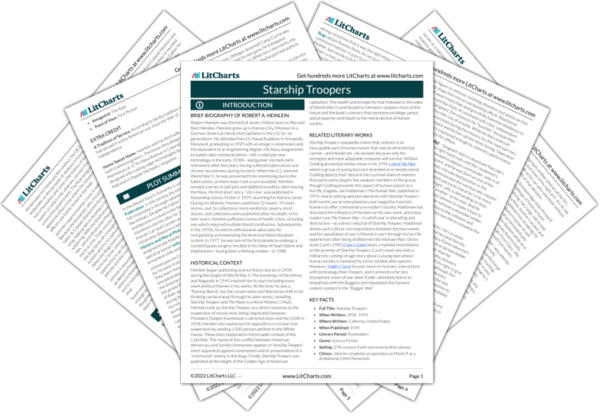Franchise Quotes in Starship Troopers
“I,” we each echoed, “being of legal age, of my own free will—”
“—without coercion, promise, or inducement of any sort, after having been duly advised and warned of the meaning and consequences of this oath—
“—do now enroll in the Federal Service of the Terran Federation of not less than two years and as much longer as may be required by the needs of the Service—
[…]
“I swear to uphold and defend the Constitution of the Federation against all its enemies on or off Terra […]
“—and to obey all lawful orders of the Commander-in-Chief of the Terran Service and of all officers or delegated persons placed over me—
“—and to require such obedience from all members of the Service or other persons or non-human beings lawfully placed under my orders—
“—and, on being honorably discharged at the completion of my full term of service […] to carry out all duties and obligations and to enjoy full privileges of Federation citizenship including but not limited to the duty, obligation, and privilege of exercising sovereign franchise for the rest of my natural life.”
This very personal relationship, ‘value,’ has two factors for a human being: first, what he can do with a thing, its use to him … and second, what he must do to get it, its cost to him. There is an old song which asserts ‘the best things in life are free.’ Not true! Utterly false! This was the tragic fallacy which brought on the decadence and collapse of the democracies of the twentieth century; those noble experiments failed because the people had been led to believe that they could simply vote for whatever they wanted … and get it, without turmoil, without sweat, without tears.
Nevertheless, I had signed up in order to win a vote.
Or had I?
Had I ever cared about voting? No, it was the prestige, the pride, the status…of being a citizen.
Or was it?
I couldn’t remember to save my life why I had signed up.
Anyhow, it wasn’t the process of voting that made a citizen—the Lieutenant had been a citizen in the truest sense of the word, even though he had not lived long enough ever to cast a ballot. He had “voted” every time he made a drop.
And so had I!
I could hear Colonel Dubois in my mind: “Citizenship is an attitude, a state of mind, an emotional conviction that the whole is greater than the part…and that the part should be humbly proud to sacrifice itself that the whole may live.”
“The ruling nobles of many another system were a small group fully aware of their grave power. Furthermore, our franchised citizens are not everywhere a small fraction; you know or should know that the percentage of citizens among adults ranges from over eighty percent on Iskander to less than three per cent in some Terran nations—yet government is much the same everywhere. Nor are the voters picked men; they bring no special wisdom, talent, or training to their sovereign tasks. So what difference is there between our voters and wielders of franchise in the past? Under our system every voter and officeholder is a man who has demonstrated through voluntary and difficult service that he places the welfare of the group ahead of personal advantage.
“And that is the one practical difference.
“He may fail in wisdom, he may lapse in civic virtue. But his average performance is enormously better than that of any other class of rulers in history.”
Superficially, our system is only slightly different; we have democracy unlimited by race, color, creed, birth, wealth, sex, or conviction, and anyone may win sovereign power by a usually short and not too arduous term of service—nothing more than a light workout to our cave-man ancestors. But that slight difference is one between a system that works, since it is constructed to match the facts, and one that is inherently unstable. Since sovereign franchise is the ultimate in human authority, we ensure that all who wield it accept the ultimate in social responsibility—we require each person who wishes to exert control over the state to wager his own life—and lose it, if need be—to save the life of the state. The maximum responsibility a human can accept is thus equated to the ultimate authority a human can exert. Yin and yang, perfect and equal.












